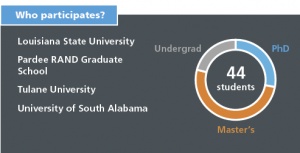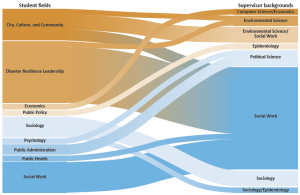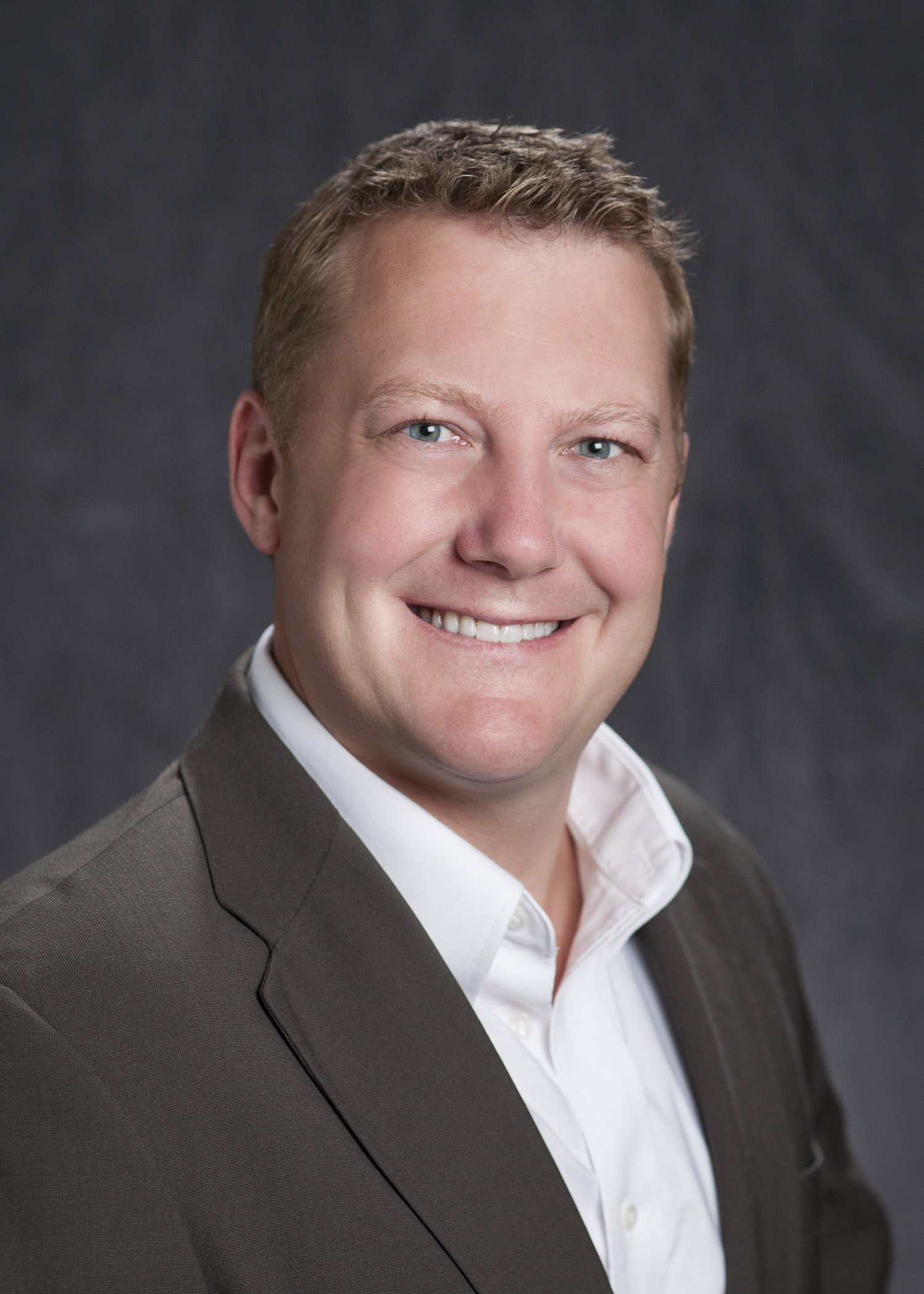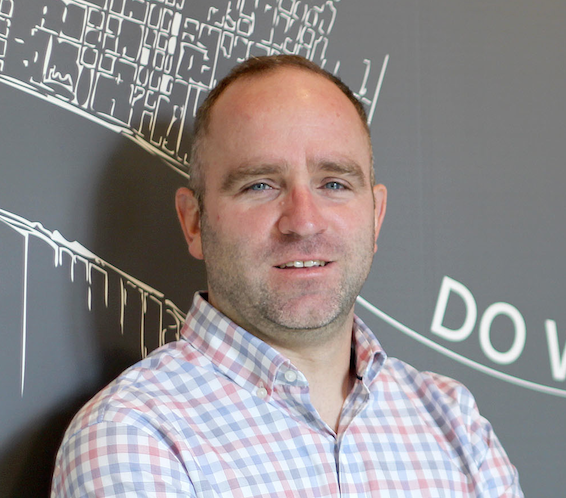Education Initiatives
The Consortium for Resilient Gulf Communities (CRGC) prepares students to become leaders and experts in community resilience. CRCG provides graduate and undergraduate students from the Gulf States with hands-on opportunities to work with trans-disciplinary research methods and best practices for addressing community disasters. Download CRGC’s 2-Pager about its Student Initiatives.
Who Are Our Students?
As of January 2019, we have had more than 40 students work with us, hailing from the Louisiana State University, Mississippi State University, Pardee RAND Graduate School, Tulane University, and the University of South Alabama.
How Are Students Benefiting from CRGC’s Trans-disciplinary Commitment?
CRGC experts come from from diverse fields. Working directly with experts outside their own fields of study enhances students’ insights about disaster, recovery, and resilience, while improving their problem solving skills and passion for their work.
- More than 50% of these students have worked with supervisors from an academic background different than their own.
- 3 of the 5 Ph.D. students are working with supervisors from different institutions, widening their knowledge base and their professional network.
- 90% of our students anticipate a career that involves interdisciplinary work.
- 2 students have been recognized as GoMRI Scholars by CRGC’s funder
What Have CRGC Students Been Doing?
- Assessing the Economic Impact of Disasters: Jacqueline Fiore, a Ph.D. student in Tulane University’s Economic Analysis and Policy program, is working with RAND economists Drs. Shanti Nataraj and Craig Bond to study the Deepwater Horizon oil spill’s socioeconomic impacts on Gulf fisheries. Her work is highlighted here.
- Collecting and Reviewing Scientific Literature: Undergraduate students in Tulane University’s Computer Science Department have been working with Dr. Brent Venable to review literature and to develop artificial intelligence methods to support a web portal for CRGC that matches stakeholders with relevant resilience resources. Graduate students at Tulane University’s Disaster Resilience Leadership Academy have worked with Drs. Ky Luu, Laura Haas, and Reggie Ferreira, to create an annotated bibliography on resilience literature and review hazard management planning documents.
- Laying the Foundation for the STRONG Survey: The STRONG survey seeks to assess Gulf residents’ current health and wellbeing. Vanessa Parks, a Ph.D. student in LSU’s Department of Sociology completed a summer of training as a research associate at the RAND Corporation’s office in Washington, DC, under the direction of Dr. Rajeev Ramchand, RAND, Psychiatric Epidemiology. Vanessa was instrumental in laying the foundation for the design, administration, and analysis of STRONG. Her work is highlighted here.
- Analyzing Data: Amanda Edelman, a Ph.D. student at the Pardee RAND Graduate School of Public Policy, is working with Drs. Melissa Finucane, Andy Parker, and Holly Scheib, to support data analysis for risk communication and evaluation studies.
- Managing Data: Leah Drakeford, a Ph.D. student in LSU’s Department of Sociology, is the CRGC Data Manager. She is responsible for understanding GRIIDC data storage procedures and policies and is helping to ensure that all CRGC data is compliant.
- Training Community Health Workers: Graduate students at the University of South Alabama’s Coastal Resource and Resiliency Center have worked with Drs. Keith Nicholls and Steven Picou to support the training and implementation of Community Health Workers in three coastal communities in Southeast Louisiana and Alabama.
GoMRI Student Initiative
CRGC launched a list serve for students from all GoMRI-funded consortia to use as a platform to connect with one another, and to facilitate their cross-institutional access to researchers and resources.
As part its Student Initiative, CRGC offered a webinar series for graduate students since Fall 2016. The goal of this series is to highlight themes of trans-disciplinary interest and increase professionalization. The series is open to any GoMRI-funded student and can be found on the CRGC website. Upcoming webinar topics include: “Communicating Your Research;” “Research Integration;” and “Applied Centers in Research Settings.”
Past Webinars
September 2016 – The Work of Research: Exploring Cross-Sector Career Paths
November 2016 – Benefits and Challenges of Stakeholder Engagement
April 2017 – Women in Science and Research
September 2017 – Expert Spotlight Series: A Discussion with Dr. Chuck Wilson, GoMRI’s Chief Scientific Officer
October 2017 – Student Spotlight Series: Navigating the Grad School Process
April 2018 – The Benefits and Challenges of Interdisciplinary Research
Current CRGC Graduate Students
Margaret Chamberlin
Graduate Student and Research Assistant, Pardee RAND Graduate School
Margaret Chamberlin is a Ph.D. candidate at the Pardee RAND Graduate School and an assistant policy analyst at RAND. Her dissertation research employs mixed methods to better understand where and why breakdowns happen in long-term management of complex chronic conditions, using eating disorders and diabetes as case studies. Before RAND she worked as a health economist and policy advisor for the Assistant Secretary for Preparedness and Response of the U.S. Department of Health and Human Services from 2011-2014.
Amanda Edelman
Graduate Student and Research Assistant, Pardee RAND Graduate School
Amanda Edelman is a Ph.D. candidate at the Pardee RAND Graduate School and an assistant policy analyst at RAND. Her research interests include city government and processes, policy implementation, STEM education, community resilience, climate change, and social network analysis. Her dissertation is investigating policy innovation and diffusion through major U.S. Cities.
Vanessa Parks
Graduate Student and Research Assistant, Louisiana State University
Vanessa Parks is a graduate student and research assistant at Louisiana State University. Her research interests include disaster resilience, health disparities, environmental sociology, and community development. She specializes in interdisciplinary health research, and she has participated in a number of needs assessments in vulnerable communities and several program evaluations related to health and education policies.
Recent Graduate
Jacqueline Fiore
Ph.D., Tulane University
Jacqueline Fiore recently received her Ph.D. from the Economic Analysis and Policy program with the Department of Economics at Tulane University. She specializes in applied microeconomics and her research interests include health economics, economics of disaster, development economics, and public policy. She has been working on the economic and health impact of the 2010 Deepwater Horizon oil spill and is interested in the impact the oil spill had on firms and human mental health outcomes in Gulf Coast communities. She is continuing to work with her mentors as a post-grad, finalizing her ongoing CRGC research.
Related News
Check Out CRGC’s Student Webinar: The Benefits and Challenges of Interdisciplinary Research
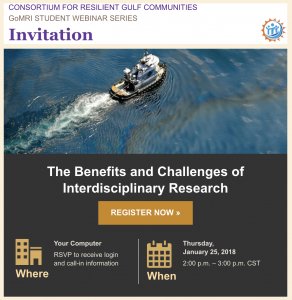 Check Out CRGC’s Student Webinar,The Benefits and Challenges of Interdisciplinary Research, featuring Rajeev Ramchand, Ph.D., a Senior Behavioral Scientist with RAND Corporation, and Michael Blum, Ph.D., an Associate Professor in the Department of Ecology and Evolutionary Biology at the University of Tennessee at Knoxvile. In this conversation, moderated by CRGC’s Director,Melissa Finucane, Ph.D., a Senior Social and Behavioral Scientist with RAND Corporation, speakers engaged in an interactive discussion to share their experiences working with people in other disciplines on research within and outside their traditional areas of expertise. To view webinar »
Check Out CRGC’s Student Webinar,The Benefits and Challenges of Interdisciplinary Research, featuring Rajeev Ramchand, Ph.D., a Senior Behavioral Scientist with RAND Corporation, and Michael Blum, Ph.D., an Associate Professor in the Department of Ecology and Evolutionary Biology at the University of Tennessee at Knoxvile. In this conversation, moderated by CRGC’s Director,Melissa Finucane, Ph.D., a Senior Social and Behavioral Scientist with RAND Corporation, speakers engaged in an interactive discussion to share their experiences working with people in other disciplines on research within and outside their traditional areas of expertise. To view webinar »
CRGC Hosts Student Webinar, The Benefits and Challenges of Interdisciplinary Research, Featuring Drs. Ramchand and Blum On Jan 25th
 CRGC’s upcoming GoMRI student webinar,The Benefits and Challenges of Interdisciplinary Research, will feature Rajeev Ramchand, Ph.D., a Senior Behavioral Scientist with RAND Corporation, and Michael Blum, Ph.D., an Associate Professor in the Department of Ecology and Evolutionary Biology at the University of Tennessee at Knoxvile. In this conversation, moderated by CRGC’s Director, Melissa Finucane, Ph.D., a Senior Social and Behavioral Scientist with RAND Corporation, speakers will engage in an interactive discussion to share their experiences working with people in other disciplines on research within and outside their traditional areas of expertise. The webinar will take place on Thursday, January 25, 2018 from 2pm – 3pm CST. All students working across GoMRI-funded consortia are invited to join! To register and learn more about the webinar »
CRGC’s upcoming GoMRI student webinar,The Benefits and Challenges of Interdisciplinary Research, will feature Rajeev Ramchand, Ph.D., a Senior Behavioral Scientist with RAND Corporation, and Michael Blum, Ph.D., an Associate Professor in the Department of Ecology and Evolutionary Biology at the University of Tennessee at Knoxvile. In this conversation, moderated by CRGC’s Director, Melissa Finucane, Ph.D., a Senior Social and Behavioral Scientist with RAND Corporation, speakers will engage in an interactive discussion to share their experiences working with people in other disciplines on research within and outside their traditional areas of expertise. The webinar will take place on Thursday, January 25, 2018 from 2pm – 3pm CST. All students working across GoMRI-funded consortia are invited to join! To register and learn more about the webinar »
CRGC Hosts Student Webinar Featuring GoMRI Student Panelists On Oct 26th
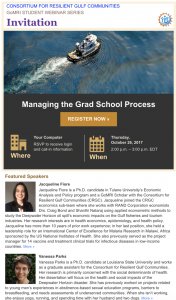 CRGC’s upcoming GoMRI student webinar, Managing the Grad School Process, will feature Jacqueline Fiore— a Ph.D. candidate in Tulane University’s Economic Analysis and Policy program and a member of CRGC’s Economics subteam— and Vanessa Parks— a Ph.D. candidate at Louisiana State University and a member of CRGC’s Health subteam. The webinar will take place on Thursday, October 26 from 1pm – 2pm CDT. The conversation is designed to provide current graduate students with helpful tips and strategies on navigating the graduate school process. Fiore and Parkes will discuss an array of interesting topics, including interacting with advisors, publishing articles, the necessity of internships, and other practical bits of advice for students. All students working across GoMRI-funded consortia are invited to join! To register and learn more about the webinar »
CRGC’s upcoming GoMRI student webinar, Managing the Grad School Process, will feature Jacqueline Fiore— a Ph.D. candidate in Tulane University’s Economic Analysis and Policy program and a member of CRGC’s Economics subteam— and Vanessa Parks— a Ph.D. candidate at Louisiana State University and a member of CRGC’s Health subteam. The webinar will take place on Thursday, October 26 from 1pm – 2pm CDT. The conversation is designed to provide current graduate students with helpful tips and strategies on navigating the graduate school process. Fiore and Parkes will discuss an array of interesting topics, including interacting with advisors, publishing articles, the necessity of internships, and other practical bits of advice for students. All students working across GoMRI-funded consortia are invited to join! To register and learn more about the webinar »
CRGC Hosts Student Webinar Featuring GoMRI Chief Scientific Officer, Chuck Wilson On Sept 28th
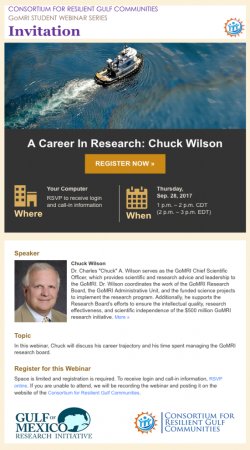 CRGC’s upcoming GoMRI student webinar, A Career in Research, will feature Dr. Charles “Chuck” A. Wilson, who serves as the GoMRI Chief Scientific Officer.
The webinar will take place on Thursday, September 28 from 1PM – 2 PM CDT.
Dr. Wilson will discuss his career trajectory and his time spent managing the GoMRI research board during this interactive session. All students working across GoMRI-funded consortia are invited to join!
Register and learn more about the webinar »
CRGC’s upcoming GoMRI student webinar, A Career in Research, will feature Dr. Charles “Chuck” A. Wilson, who serves as the GoMRI Chief Scientific Officer.
The webinar will take place on Thursday, September 28 from 1PM – 2 PM CDT.
Dr. Wilson will discuss his career trajectory and his time spent managing the GoMRI research board during this interactive session. All students working across GoMRI-funded consortia are invited to join!
Register and learn more about the webinar »
Student Spotlight: Megha Patel
 Megha Patel is a Ph.D. candidate in Social Work with the interdisciplinary City, Culture, and Community program at Tulane University. She has experience managing programs and conducting evaluations in collaboration with community-based organizations, government agencies, and academic institutions in the U.S. and abroad. Megha is contributing to CRGC’s Community Action Planning and Resilience Building efforts.
Megha Patel is a Ph.D. candidate in Social Work with the interdisciplinary City, Culture, and Community program at Tulane University. She has experience managing programs and conducting evaluations in collaboration with community-based organizations, government agencies, and academic institutions in the U.S. and abroad. Megha is contributing to CRGC’s Community Action Planning and Resilience Building efforts.
Grad Student Parks Assesses How Disasters and Social Factors Influence Human Health
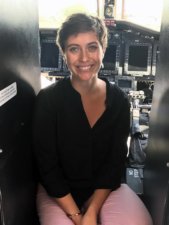 GoMRI features CRGC grad student, Vanessa Parks, and her work compiling and analyzing data on Gulf Coast communities that explores how the Deepwater Horizon oil spill affected mental and physical health as well as how social factors contributed to post-disaster health outcomes. Learn more »
GoMRI features CRGC grad student, Vanessa Parks, and her work compiling and analyzing data on Gulf Coast communities that explores how the Deepwater Horizon oil spill affected mental and physical health as well as how social factors contributed to post-disaster health outcomes. Learn more »
CRGC Student Spotlight: Betsy Lopez
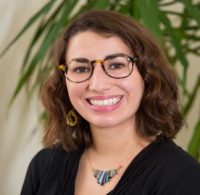 Betsy Lopez is a Master of Science candidate in the Disaster Resilience Leadership Academy at Tulane University. Betsy also works as the program coordinator of Internships and Experiential Learning at the Newcomb College Institute, where she oversees and develops experiential learning opportunities for students, manages grants and endowments, developed and oversees the alumnae-mentoring program, and coordinates the Kenya summer abroad program.
Betsy Lopez is a Master of Science candidate in the Disaster Resilience Leadership Academy at Tulane University. Betsy also works as the program coordinator of Internships and Experiential Learning at the Newcomb College Institute, where she oversees and develops experiential learning opportunities for students, manages grants and endowments, developed and oversees the alumnae-mentoring program, and coordinates the Kenya summer abroad program.
CRGC Hosting GoMRI Student Webinar on Women in Science and Research
 On Thursday, April 13th, CRGC will host its next webinar for students workings across all GoMRI-funded consortia. Women in Science and Research, which will highlight female researchers and provide an opportunity for discussion around women working in science and issues related to gender equity in the field. Learn more »
On Thursday, April 13th, CRGC will host its next webinar for students workings across all GoMRI-funded consortia. Women in Science and Research, which will highlight female researchers and provide an opportunity for discussion around women working in science and issues related to gender equity in the field. Learn more »
CRGC Student Spotlight: Nicholas Thomas
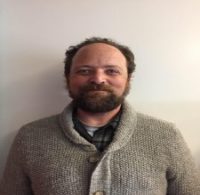 Nicholas Thomas is a CRGC graduate student currently pursuing a Ph.D. from Tulane University’s School of Public Health and Tropical Medicine.
Nicholas Thomas is a CRGC graduate student currently pursuing a Ph.D. from Tulane University’s School of Public Health and Tropical Medicine.
CRGC Students Showcase Poster Presentation on Utilizing Lay Health Workers Post-Disaster
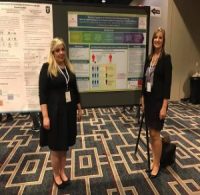 Alyssa Wood and Keagan Smith, from the University of South Alabama showcase their poster presentation at the 2017 Gulf of Mexico Oil Spill & Ecosystem Science Conference, which took place February 6-9 in New Orleans, LA.
Alyssa Wood and Keagan Smith, from the University of South Alabama showcase their poster presentation at the 2017 Gulf of Mexico Oil Spill & Ecosystem Science Conference, which took place February 6-9 in New Orleans, LA.

